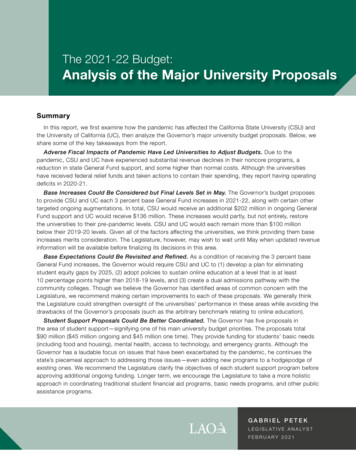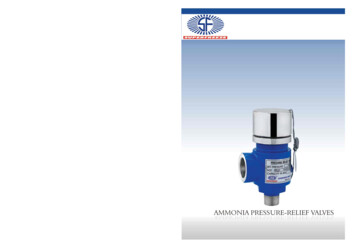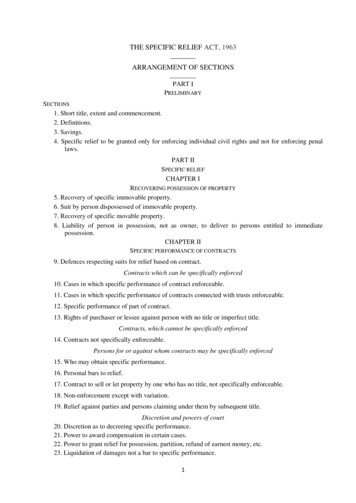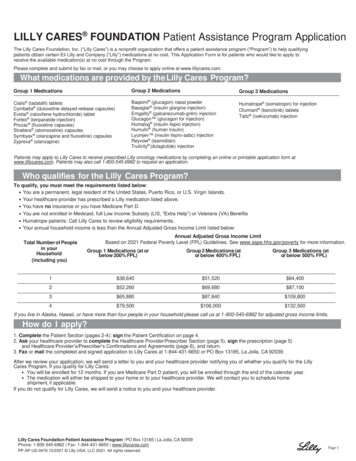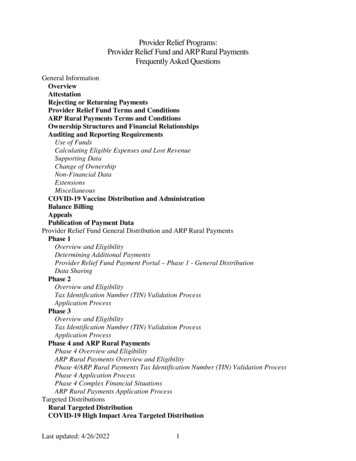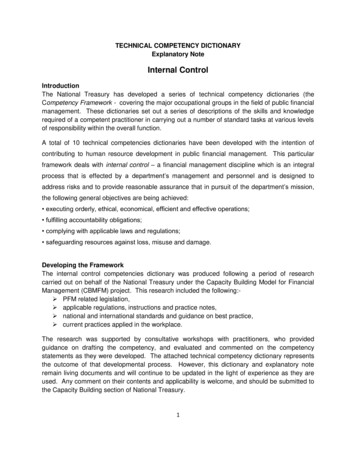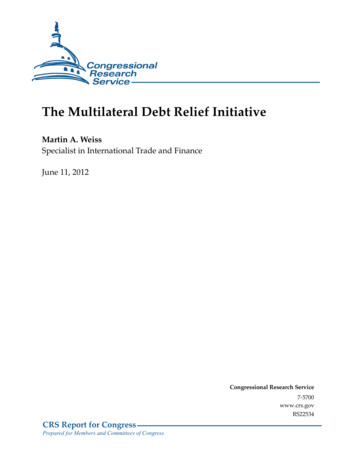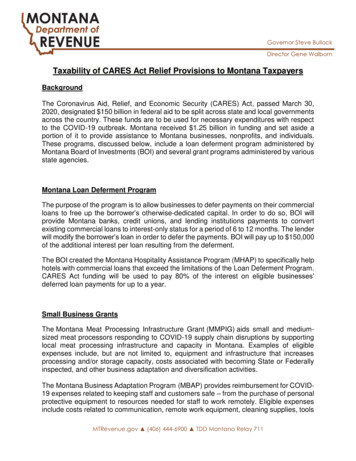
Transcription
Taxability of CARES Act Relief Provisions to Montana TaxpayersBackgroundThe Coronavirus Aid, Relief, and Economic Security (CARES) Act, passed March 30,2020, designated 150 billion in federal aid to be split across state and local governmentsacross the country. These funds are to be used for necessary expenditures with respectto the COVID-19 outbreak. Montana received 1.25 billion in funding and set aside aportion of it to provide assistance to Montana businesses, nonprofits, and individuals.These programs, discussed below, include a loan deferment program administered byMontana Board of Investments (BOI) and several grant programs administered by variousstate agencies.Montana Loan Deferment ProgramThe purpose of the program is to allow businesses to defer payments on their commercialloans to free up the borrower’s otherwise-dedicated capital. In order to do so, BOI willprovide Montana banks, credit unions, and lending institutions payments to convertexisting commercial loans to interest-only status for a period of 6 to 12 months. The lenderwill modify the borrower’s loan in order to defer the payments. BOI will pay up to 150,000of the additional interest per loan resulting from the deferment.The BOI created the Montana Hospitality Assistance Program (MHAP) to specifically helphotels with commercial loans that exceed the limitations of the Loan Deferment Program.CARES Act funding will be used to pay 80% of the interest on eligible businesses’deferred loan payments for up to a year.Small Business GrantsThe Montana Meat Processing Infrastructure Grant (MMPIG) aids small and mediumsized meat processors responding to COVID-19 supply chain disruptions by supportinglocal meat processing infrastructure and capacity in Montana. Examples of eligibleexpenses include, but are not limited to, equipment and infrastructure that increasesprocessing and/or storage capacity, costs associated with becoming State or Federallyinspected, and other business adaptation and diversification activities.The Montana Business Adaptation Program (MBAP) provides reimbursement for COVID19 expenses related to keeping staff and customers safe – from the purchase of personalprotective equipment to resources needed for staff to work remotely. Eligible expensesinclude costs related to communication, remote work equipment, cleaning supplies, toolsMTRevenue.gov (406) 444-6900 TDD Montana Relay 711
August 18, 2020p. 2to enhance social distancing and sanitation, and travel and hotel costs related toquarantining workers.The Montana Business Stabilization Program (MBSP) provides working capital for smallbusinesses to support payroll, rent, accounts payable, debt service and expenses relatedto shifts in operations in order to retain existing businesses, retain current employees orretain business viability for future re-employment.The Montana Innovation Grant Program (MIGP) helps companies scale up, improvecapabilities, or drive expanded distribution of products or services developed in responseto COVID-19. Projects should demonstrate significant impact in improving public health,safety, and economic impact.The Montana Food and Agriculture Adaptability Program (MFAAP) is for food andagriculture businesses to help increase community resilience amid the COVID 19pandemic and other economic disruptions. Grants are intended to create additionaleconomic activity and bolster food security. Examples of eligible projects include, but arenot limited to, those focused on accessing new markets, projects which strengthen andexpand local food systems, and other business adaptations that decrease food andagricultural waste. The need for such innovations must be driven by the COVID 19pandemic.Grants to Local Governments, Non-profits, and IndividualsThe Local Government Reimbursement Program (LGRP) isgovernments for direct costs associated with COVID-19.availabletolocalPublic Health Grants (PHG) are available to local and tribal health departments and urbanIndian health centers to help in the response to COVID-19 and to meet the needs of theircommunities.Stay Connected Grants (SCG) are available to area agencies on aging, assisted livingfacilities, nursing homes, tribal elder services, and Critical Access Hospitals. Grant fundscan be used to fund technologies and other efforts to encourage physically distant formsof social interaction for elderly Montanans during the COVID-19 public health emergency.Food Bank and Food Pantry Assistance Grants (FBFPAG) are available to communityorganizations providing food assistance to Montanans with limited resources, food banks,food pantries, community cupboards, and entities with infrastructures already in place tobegin new food distribution programs. The program is designed to increase food securityfor Montanans hardest hit by the COVID-19 pandemic.Social Services Nonprofit Grants (SSNG) are available to Montana-based social servicenonprofits impacted by the COVID-19 public health emergency to retain existingMTRevenue.gov (406) 444-6900 TDD Montana Relay 711
August 18, 2020p. 3programs and services, employees, or organizational viability for provision of futureservices and operations.Telework Assistance Grants (TAG) are available to go towards purchasing equipment toassist Montanans with disabilities access telework equipment. DPHHS will partner with alocal non-profit organization to assess and support assistive technology needs ofindividuals with disabilities during COVID-19. This assistance will help ensure people withdisabilities have the equipment needed to adapt to the change in working environmentdue to COVID-19.Questions Are the payments received from BOI taxable?These payments are gross income under IRC § 61(a)(1), and, therefore, taxable to banksand financial institutions that are not explicitly exempt in the Internal Revenue Code orMontana Code Annotated.Credit unions are tax-exempt under IRC § 501(c)(14) and § 32-3-901, MCA.Loan deferments or modifications for individual or business borrowers are not taxable asthey do not constitute income under IRC § 61.The borrower may not deduct any interest paid by BOI. Should the BOI issue Forms 1099 to lenders that participate in the loan defermentprogram?The state should issue Form 1099-MISC to entities other than corporations or limitedliability companies electing to be taxed as corporations receiving BOI payments. Are grant payments made from funds delegated to Montana by the CARES Actrequired to be included in a grant recipient’s gross income?Grant funds from MMPIG, MBAP, MBSP, MIGP, MFAAP, and SCG programs arerequired to be included in a grant recipient’s gross income if the recipient is a business.Under IRC § 61, all gains or undeniable accessions to wealth, clearly realized, over whichtaxpayers have complete dominion or control over are considered taxable income unlessspecifically exempt. Commissioner v. Glenshaw Glass Co., 348 U.S. 426 (1955), 1955-1C.B. 207. Recipients of all five grant programs have discretion on how to spend thosefunds (within the parameters of the program). Therefore, payments made under the fivegrant programs are included within the broad definition of “gross income” under IRC §61.MTRevenue.gov (406) 444-6900 TDD Montana Relay 711
August 18, 2020p. 4Prior to the Tax Cuts and Jobs Act (TCJA) of 2017, corporations could omit contributionsto capital from their gross income. However, TCJA removed the exemption forcontributions of capital from government entities. Because the grants are from agovernment entity, corporations must also include the grants received as taxable income.See IRC § 118(b)(2).It should be noted that while a grant recipient is required to include the grant in its grossincome, it can deduct and/or capitalize the business expenses it paid for with grantfunds.Organizations formed under IRC § 501 are exempt from taxation unless they receiveincome unrelated to their charitable mission under IRC § 511. If organizationsare formed under IRC § 501 and the grant funds are related to the organization’s mission,they will be exempt from taxation under IRC § 501. Therefore, grant funds from the LGRP,PHG, SCG (to non-profit organizations), FBFPAG, SSNG, and TAG are not taxable.The target recipients for the LGRP and PHG are local and tribal governments along withorganizations they control. Governments and governmental units are not subject toincome tax.Finally, TAG funds recipients are individuals with disabilities. These grants are created tokeep disabled individuals working. It is unclear if local non-profit organizations or theindividuals will receive the funds directly. However, if the funds were to go directly toindividual recipients, the funds would fit within the broad definition of IRC § 139(b)(4),which states that “qualified disaster relief payments” are an amount paid to or for thebenefit of an individual by a Federal, State, or local government, or agency orinstrumentality thereof, in connection with a qualified disaster in order to promote thegeneral welfare. The department believes that keeping individuals employed constitutes“general welfare.” If the funds were to go directly to the local non-profit organization todisburse to disabled individuals, the same logic would apply to those organizations asdescribed above. If the organization is organized under IRC § 501 and the grant fundsare related to the organization’s mission, they would be exempt from taxation under IRC§ 501. Should the state issue Forms 1099 to grant recipients?Per the federal Form 1099-G instructions, the state of Montana should report amountsof taxable grants of 600 or more to recipients that are businesses. Therefore, the stateshould issue Forms 1099-G to businesses that are recipients of the MMPIG, MBAP,MBSP, MIGP, MFAAP, and SCG programs.Paycheck Protection ProgramAs a part of the CARES Act, the federal government created the Paycheck ProtectionProgram (PPP). The PPP is a loan program that provides cash-flow assistance to smallbusinesses as an incentive for businesses to retain their employees during the COVIDMTRevenue.gov (406) 444-6900 TDD Montana Relay 711
August 18, 2020p. 519 pandemic. If the recipient fully spends the funds on payroll costs, interest onmortgages, rent, and utilities, the loan can be fully forgiven. The CARES Act hasspecifically excluded the cancellation of debt income from the PPP loans from grossincome. See Pub. L. No. 116-136, § 1106(i). As a result, this income is also excludedfrom gross income in Montana, per § 15-30-2101(10), MCA.The five state of Montana grant programs should not be confused with the PPP.On July 6, 2020, the IRS released “frequently asked questions” regarding grants made tosmall businesses as a result of the CARES Act Relief Funds delegated to state and localgovernments. The IRS has affirmed that these grants shall not be excluded from abusiness’s gross income. Visit relief-fund-frequently-asked-questions for more information.Coronavirus Food Assistance ProgramThe CARES Act allocated 450,000,000 to the United States Department of Agricultureto prevent, prepare for, and respond to the coronavirus, domestically or internationally,for the emergency food assistance program. A part of this allocation was used to createthe Coronavirus Food Assistance Program. This program, administered by the USDA,provides direct support to farmers who suffered a five percent or greater price decline orwho had losses due to market chain disruptions due to Coronavirus. Recipients of thesefunds must include them in their gross taxable income as there is not a specific exemptionfor them in IRC or MCA.MTRevenue.gov (406) 444-6900 TDD Montana Relay 711
taxpayers have complete dominion or control over are considered taxable income unless specifically exempt. Commissioner v. Glenshaw Glass Co., 348 U.S. 426 (1955), 1955-1 C.B. 207. Recipients of all five grant programs have discretion on how to spend those funds (within the parameters of the program). Therefore, payments made under the five
